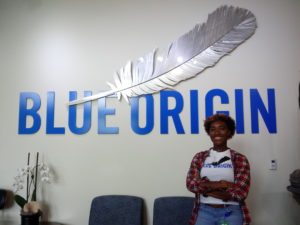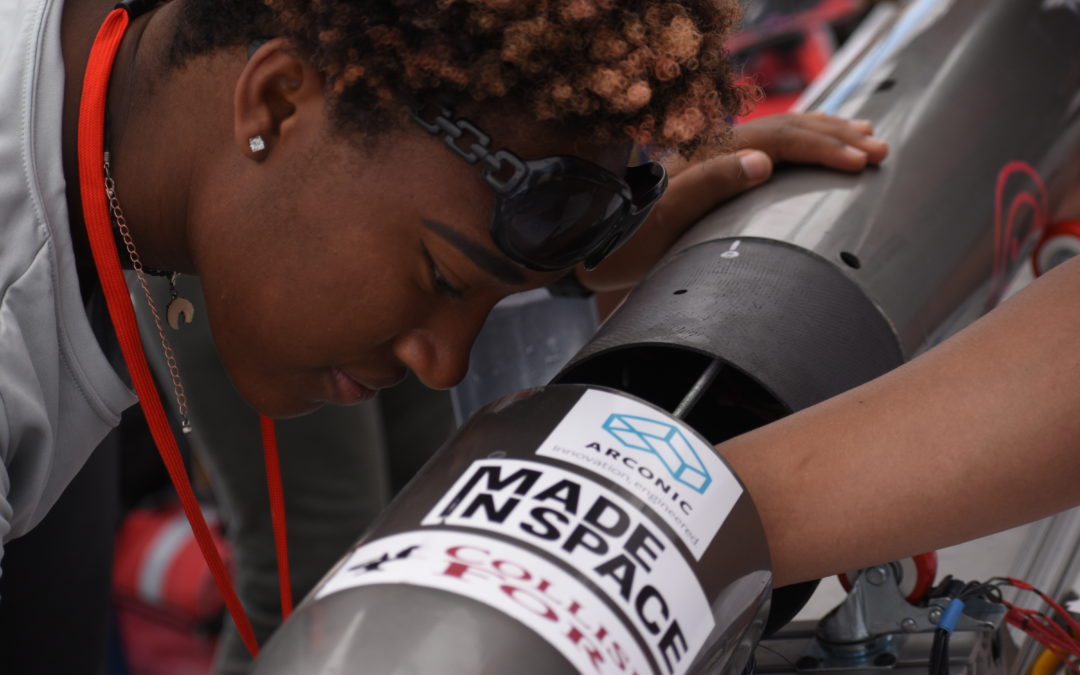By Christine Byrd, Communications Director
Joyce Smith is finishing her final year as an aerospace engineering student at The Ohio State University, but already her career is on a stellar track. She has a full-time job lined up at Blue Origin, the spaceflight company founded by Amazon’s Jeff Bezos.
“I was always the kid who wanted to be an astronaut, wanted to work on space and rockets,” she says. “So it’s come as no surprise that I’m doing what I’m doing now.”
She landed at Blue Origin due to her own talents and hard work, plus a little matchmaking from Base 11, a nonprofit on a mission to solve the talent shortage in science, technology, engineering and math (STEM) by accelerating more women and underrepresented students on the pathway to STEM success.
“Imposter syndrome is real,” acknowledges Smith. “Especially when you’re surrounded by people who don’t look like you or think like you or share the same background as you.”
Aiming for the stars
Raised in a family of eight children in Cincinnati, Ohio, Smith grew up fascinated by news about the International Space Station. Although she studied dance at an arts high school, she always knew that she’d end up in space.
She thought of pursuing astronomy or astrophysics, but she loved calculus so much that when her high school teacher mentioned that engineers use calculus all the time, that convinced her to choose engineering as a major.
Going to The Ohio State University on a scholarship, Smith quickly discovered that not many of her classmates looked like her or shared similar backgrounds. Out of about 75 people in her aerospace engineering cohort, only five are women, and only three are women of color, she says. The experience was isolating, but also motivating.
“If anything, it gives me more motivation to make sure that I make it through,” Smith says.
Getting hands-on experience
Smith joined the propulsion team of the Buckeye Space Launch Initiative her second year at OSU. The team gave her hands-on experience designing, building, testing, and launching rockets.
“In the aerospace program you learn the theory, you learn the fundamentals, but not the applications,” says Smith. “Buckeye Space Launch Initiative has been crucial to my technical knowledge in the industry, especially about propulsion.”
She traveled to the Spaceport America Cup competition in New Mexico in both 2018 and 2019 to help the team launch their rocket. There, she joined more than 1,500 rocketry students from all around the world launching solid and liquid-fueled rockets.
“It’s always an amazing experience to see people not only from the U.S. but from around the world, all working on the same things you’re working on and trying to achieve the same goals,” says Smith.
In 2018, when the Base 11 Space Challenge was announced, a $1 million prize for the first student-led team to launch a liquid-fuel rocket to the Von Karman Line, the Buckeye Space Launch Initiative signed up.
“Our team is called the Buckeye Space Launch Initiative for a reason. Space has always been the goal,” says Smith. “When we first heard about the Base 11 Space Challenge, it sounded very exciting and we knew that we couldn’t pass up the opportunity to participate.”
Going Blue
Blue Origin is a platinum level sponsor of the Base 11 Space Challenge, and offers spots in its highly competitive paid summer internship program to students in the challenge. Like most aerospace employers, Blue Origin heavily values hands-on rocketry experience like what Smith had gained with the Buckeyes.
Heather Nelson, Blue Origin’s University Relations Manager, emphasizes, “When selecting students for our internship and early-career opportunities, we look for people with hands-on engineering experience. It does not have to be rockets, but some sort of project experience that includes designing, building, testing, breaking…redesigning, rebuilding…etc. Additionally we look for students who are interested in working on diverse teams and being part of creating an inclusive culture where every person can bring their best self to work.”
After multiple rounds of interviews, Smith was selected for the summer 2019 internship to work on Blue Origin’s engines at the Kent, Washington location. Because of her interest in propulsion, Smith was assigned to work in the engines business unit, focusing on additive manufacturing of engine parts. She was surprised at the level of responsibility she was given, she realized the team at Blue Origin believed in her completely, and she quickly rose to the challenge.
“They put me on the project and had faith I would do well,” she says. “I have never felt so inspired and validated and uplifted.”

In addition to receiving competitive pay throughout their internship, the students are housed in furnished apartments and given lots of opportunities to build community with each other and with Blue Origin employees. One of the biggest surprises was the extent to which the company values diversity.
“Blue is such a diverse company, and it’s great to know that there are people within the company who express themselves in their identities and prioritize diversity initiatives,” Smith says. Over the summer, Smith interacted with Blue Origin’s internal groups for African American employees and for those who identify as LGBTQ.
At the end of the summer, she was offered a job at the company’s Van Horn, Texas location as an engine development engineer. She did not have to think twice before accepting it.
“Blue has a unique working environment, and they are doing exactly what I want to do, for exactly the reason I want to do it,” she says. “2020 and beyond is going to be just groundbreaking for the commercial space industry as a whole, and I am excited knowing that once I graduate I will be in that — and that I have worked hard, and I deserve to be there, and I have earned my place to put my little footprint on history.”
Follow Joyce’s journey on LinkedIn.


What an inspiring article! I love stories like this; congratulations, Joyce Smith.
I am so proud of you and I know you will be great 😘
God Bless Smith, she will inspire more African American female students across the
country to bring the 💰
Bag of Diversity to the AEROSPACE ENGINEERING DEGREE
PROGRAM. Way to Go
Joyce TAKE ME AWAY 🚀